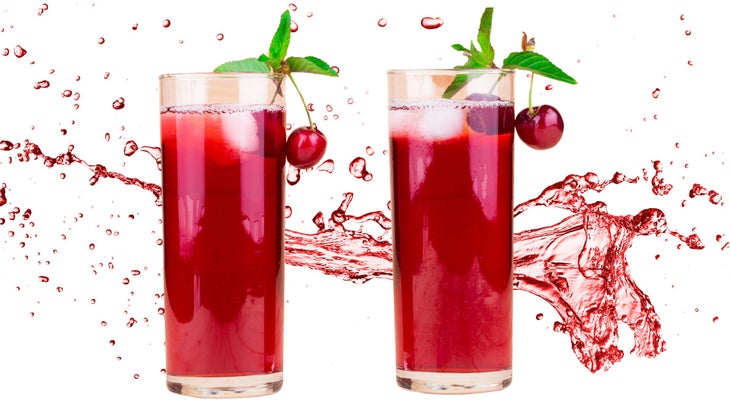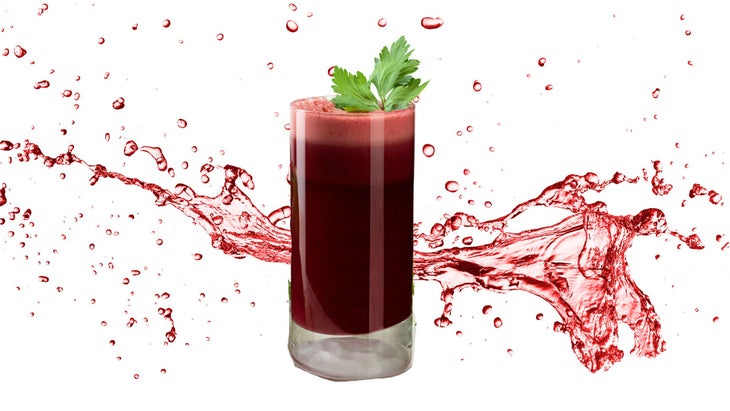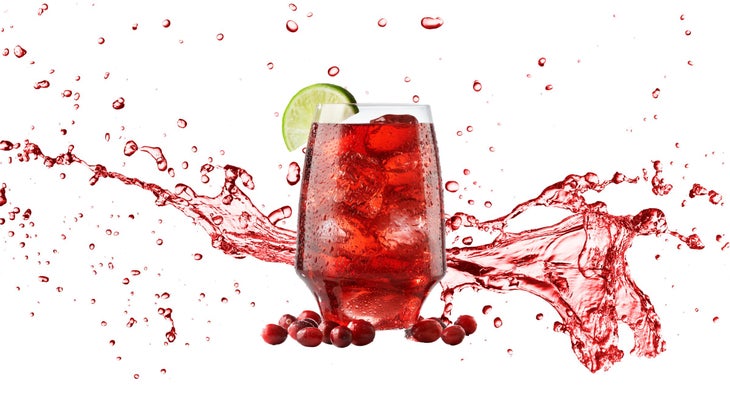New perk: Easily find new routes and hidden gems, upcoming running events, and more near you. Your weekly Local Running Newsletter has everything you need to lace up! Subscribe today.
A few weeks before this year’s Boston Marathon, my husband came home from a group run with a dozen packets of a tart cherry juice marketed to athletes for its recovery-boosting antioxidant contents. A sales rep, who had been handing out the concentrate, convinced him that we needed to drink them after every run to prep for race day. But I have an almost superstitious allegiance to pre-race beet juice, and adding another drink—let alone one I didn’t know much about—to my lineup felt like a bit much. When I came across a 2023 study extolling the benefits of cranberry supplementation, I had to ask: What is it with all of these juices?
With a cup of beet juice and a shot of tart cherry in hand, I called up a few experts and took a dive into the research to find out what these juices can actually offer runners—and the best ways to use them to see the biggest boost on race day.
Tart Cherry Juice

Holistic sports nutritionist Sarah Cuff, R.H.N. and founder of Eat 2 Run, encourages every runner she works with to add tart cherry juice to their diet. FYI: Tart cherries are different from sweet cherries, not only in the flavor profile (one is tart, one is sweet, we’ll leave you to guess which one is which), but also because tart cherries provide a higher amount of anthocyanins, which promote anti-inflammation in the body.
“Tart cherries improve muscle function and endurance, reduce muscle damage and soreness, and help runners recover faster so they feel better and are able to go running day after day,” Cuff says.
Additionally, tart cherries naturally contain melatonin. “Consuming some tart cherry before bed can also aid in sleep—which then helps overall recovery,” says dietitian Danielle Crumble Smith, R.D. who works with athletes through Top Nutrition Coaching.
In the lead-up to a race, Cuff recommends drinking 8 to 12 ounces of juice or 1 ounce of concentrate for four to five days prior. (You can also eat frozen tart cherries, but they can be harder to find, and you need one and a half times the amount to get the benefits of the juice, according to Cuff.) If you want to implement tart cherries year-round, she suggests minimizing the sugar you’re ingesting by sticking to a lower dose of about a quarter to a half cup of juice in your morning smoothie or just before bed for the sleep benefits.
1 Cup of Tart Cherry Juice
- 159 calories
- 37g carbohydrates (13%)
- 33g sugar
- 35mg calcium (3%)
- 1.1mg iron (6%)
- 433mg potassium (9%)
- 30mg magnesium (7%)
*All nutritional information obtained from USDA Food Composition Databases
Beet Juice

Studies show the natural dietary nitrates in beet juice (sometimes called beetroot juice) can enhance your endurance by improving blood flow. “Most people try to avoid [nitrates] when looking at deli meats,” Smith says. “But when they’re naturally produced, [nitrates] are actually really beneficial because they convert to nitric oxide in the body. And that helps improve blood flow and oxygen delivery to muscles.”
Interestingly, Cuff says the stronger your endurance, the less of an effect you might see. “There’s more benefit for a moderately-trained runner,” she says. If your aerobic system is already super well-developed, the boost is marginal. Still, even the elites want whatever boost they can get. British Olympic track and field athlete, Mo Farah, supplements his diet with beet juice.
“Still, if you’re an elite athlete looking for an edge, try beets aligned with caffeine,” Cuff says. “Let’s throw everything at it.”
Smith recommends drinking 6 to 8 ounces per day for a week or two leading up to a race, with your final glass two to three hours before you cross the starting line. If you feel like you’re consuming too many fluids on race morning (or can’t stand the flavor), Cuff says that you can take concentrated beet shots or use beet powder instead. She also recommends working a couple of beets into your night-before-the-race dinner.
Just be aware that beet juice can have unwelcome side effects. Smith points out that it reduces blood pressure, so runners who already have low blood pressure might end up lightheaded. Cuff adds that beets can be rough on some people’s digestive systems, leaving runners sprinting from porta potty to porta potty.
1 Cup of Beet Juice
- 75 calories
- 15g carbohydrates (5%)
- 2.8g fiber (10%)
- 12g sugar
- 30mg calcium (2%)
- 1.4mg iron (8%)
- 320mg potassium (7%)
Cranberry Extract

The research on cranberries is still very new, but there are promising early results. Last year, researchers at Concordia University found that after taking a cranberry supplement for 28 days, runners’ times improved by an average of 1.5 percent in a 1500-meter time trial, with better lactate clearance and reoxygenation rates. A new follow-up study found this could be credited to cranberry’s effect on the mitochondria, which got more efficient at turning oxygen into energy. Because of that, “you will have to push a little harder before you start to produce so much lactate that the pain causes you to stop,” says Andreas Bergdahl, Ph.D., the paper’s senior author.
That said, Cuff warns that it’s still early to get too excited. “I’d say, hey there’s something to this, it could turn into something worthy,” she says. But with only a couple of small studies out so far (both had fewer than 20 athletes), it’s not enough evidence to convince her to fill her athletes’ diets with cranberries just yet. The study also used a supplement, so you’d have to drink quite a bit of juice to match the dose used.
1 Cup of Cranberry Juice
- 116 calories
- 31g carbohydrates (11%)
- 31g sugar
- 20mg calcium (2%)
- 15mg magnesium (4%)
- 33mg phosphorus (3%)
- 195mg potassium (4%)
Which Juice is for You?
When it comes to which juice is best for you, we bring you the least popular answer: It depends. What tastes best to you? What settles in your stomach the best? Does one make you feel better than the others? Tart cherry and beet juice have been researched and studied more for their benefits, so some runners prefer to start with those over the less studied cranberry extract, but that doesn’t mean it can’t have benefits.
If you’re looking to improve your sleep, tart cherry juice should be your pick. If you want to improve performance goals for race day, beet juice can improve blood and oxygen flow. Both benefits are valid and important for your running practice, so it’s up to you to decide which juice you’d like to supplement with.
You might ask: Can I drink both? Technically yes, but doing so might create an excess of sugar in your diet if you’re not careful with serving sizes. If you’re hoping to reap the benefits of all the juices, you can either rotate which ones you drink or cut the quantities in half and mix together. Doing so will not change the antioxidant counts or benefits.
Before You Start Chugging…
Even if it might seem to have magical superpowers, juice of any kind includes a good deal of sugar and carbs. “As runners, there’s a danger in thinking we can consume as many carbs as we like because we need them for energy,” Cuff says. But a chronically high-carb, high-sugar diet could lead to metabolic issues down the road, which can cause serious health issues. That’s one reason she recommends choosing a concentrate with about a third fewer carbs rather than straight juice.
If you do use a tart cherry supplement regularly, Cuff recommends taking an “off-season” for a month or two every year. “If we throw large amounts of antioxidants at our bodies long-term, we have studies that show it can inhibit overall exercise adaptations,” she says. “When we are utilizing supplements, there needs to be a clear reason and a time period attached.”
It’s also good to remember that studies on these fruits don’t tell you what the diets of the athletes were like before the research began. “If you’re eating a nutrient-poor diet, then adding in supplementation will for sure benefit you because our bodies need these different nutrients,” she says. “Really, what I think all these studies are saying is, Eat your fruits and veggies—they’re good for you.”
